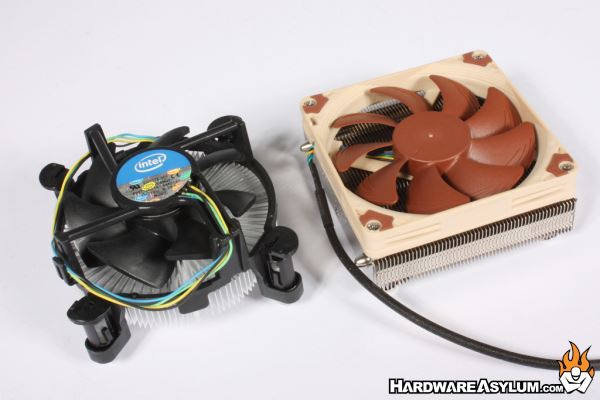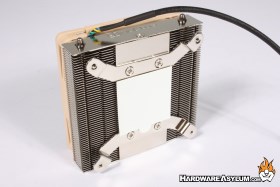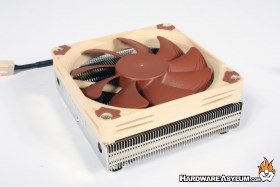Noctua NH-L9i Low Profile Heatsink Review
Author: Dennis Garcia
Published: Thursday, February 07, 2013
Introduction
Choosing a heatsink is normally pretty easy. Search for one with good performance, make sure it is within your price range and simply ensure it will work on your particular system. Of course the assumption here is that you're running a standard ATX motherboard in a modern tower chassis. But, what if you need a custom cooler for a non-traditional system like a HTPC or SFF?? These systems often feature limited space leaving you with the OEM cooler as your only option.
In this review we will be looking at a new compact heatsink from Noctua called the NH-L9i. The NH-L9i is a specially designed heatsink for small system where space is at a premium and noise is a driving factor. As you can imagine a heatsink designed for these conditions will have a few limitations so be sure to check your system specs before you begin.
In this review we will be looking at a new compact heatsink from Noctua called the NH-L9i. The NH-L9i is a specially designed heatsink for small system where space is at a premium and noise is a driving factor. As you can imagine a heatsink designed for these conditions will have a few limitations so be sure to check your system specs before you begin.

For a small form factor heatsink to be successful you must first tackle the OEM cooler and as the photo shows the Sandy/Ivy Bridge OEM cooler is quite short with a round fin style heatsink and top mounted fan. This is a classic Intel design and does quite well at keeping the Core i7 3770K within spec under stock loading conditions. Next to this is the Noctua NH-L9i. As you can see the heatsink is also quite short, even shorter than the OEM cooler, and features a low profile cooling fan that occupies the entire heatsink surface.
We should mention that there are two types of NH-L9 coolers, "I" and "a". The "I" stands for Intel and comes with a mounting configuration for Intel 1155/1156 processors while the "a" version is specially designed for AMD based systems. Another thing to make note of is the TDP limitation recommended by Noctua. For Intel Sandy Bridge based systems they recommend that you use 65w processors or less but you can step up to a 95w if you have good case ventilation. On Ivy Bridge systems they recommend 65w or less processors with a 77w max assuming you have good case ventilation and disable the turbo mode.
We should mention that there are two types of NH-L9 coolers, "I" and "a". The "I" stands for Intel and comes with a mounting configuration for Intel 1155/1156 processors while the "a" version is specially designed for AMD based systems. Another thing to make note of is the TDP limitation recommended by Noctua. For Intel Sandy Bridge based systems they recommend that you use 65w processors or less but you can step up to a 95w if you have good case ventilation. On Ivy Bridge systems they recommend 65w or less processors with a 77w max assuming you have good case ventilation and disable the turbo mode.
For our testing we had neither of these recommended processors but set out to "fake" a processor by disabling some cores and downclocking the processor. Sadly K edition processors always come with a TDP premium so we can never duplicate the heat load, but we can get close for our testing.



